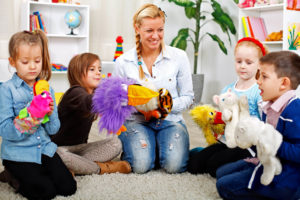BUILD SELF-CONFIDENCE THROUGH SPEECH AND DRAMA ACTIVITIES
Speech and drama activities are an ideal way to build self confidence in a child.
If you have a child anxious or afraid of speaking up in front of a class, adults, or perhaps even their peers, the suggestions and activities outlined below will help you to help them. The positive benefits will spill over into all areas of their lives.
THE LIFE CYCLE OF PUBLIC FEAR
Being afraid of public speaking is a fear acknowledged by many adults. That children are afraid of it too, shouldn’t be a surprise!
What is more of a surprise is that their fear is allowed to persist, often unchallenged, long into adulthood. They become the grown-ups who frequently say they would rather “die” than make a speech.
THE REAL UNDER-LYING FEAR
The truth is not that talking in public is a deadly disease. The real truth is many people, children included, fear making fools of themselves in front of others. Being “looked at” and “listened to” is the problem. People fear being seen, for fear they are “not good enough” or will fail in some way. Being laughed at or dismissed as stupid is the pain they’re avoiding.
The simple remedy to side-step risking exposure many people, including children, adopt is to keep out of the public eye and their mouths shut. However that solution is a boomerang.
The child who is too frightened to talk or feels so self-conscious they can’t relax and join games loses out in numerous ways. They are often overlooked by peers and teachers in favor of bolder children. The more they are marginalized the harder it becomes to join a group or allow themselves to be seen. Then, when forced by circumstance, like for instance having to give a formal speech in class, their discomfort and subsequent embarrassment or humiliation, is a self-fulfilling prophecy.
HOW TO BREAK THE CYCLE OF FEAR
Non-threatening drama and speech activities can help break the cycle. Before you use any of these suggestions to build self confidence in a child please make sure you:
- Start slowly and simply. A nervous child is easily overwhelmed. Asking too much, too soon, will compound their problems. Choose your beginning point with care. Put yourself in the child’s shoes and ask yourself, ‘Is this a little step or a giant stride?’ Being ‘cruel to be kind’ can backfire.
- Role model the behaviour you want from the child. Show them it’s OK and safe. Do the exercises with them. This has a wonderful double-whammy pay off. They feel valued because you gave them time and attention AND they are learning new skills.
About these activities
The activities to build self confidence in a child are separated into ‘speech’ and ‘drama’ because although inextricably linked, they are different.
What is speech?
Speech is how a person communicates with another. It is the conduit for spoken self- expression. A combination of vocabulary, voice and experience gives each person their unique oral signature. This is who they are. Their speech is what carries their being, their presence into the world.
What is drama?
Drama, by contrast, extends and embodies speech. To dramatize is to enact something or someone; either an aspect of oneself or someone else. Drama lifts ordinary speech into the realm of the imagination and theater. Its activities focus on living into other worlds or experiences while speech ones concentrate on developing and extending oral language skills. Drama teaches empathy. Handled well, drama builds self confidence through providing opportunities to experience the world from perspectives outside his own. He does not become an egoistical show-off constantly needing applause. Instead he becomes humane.

